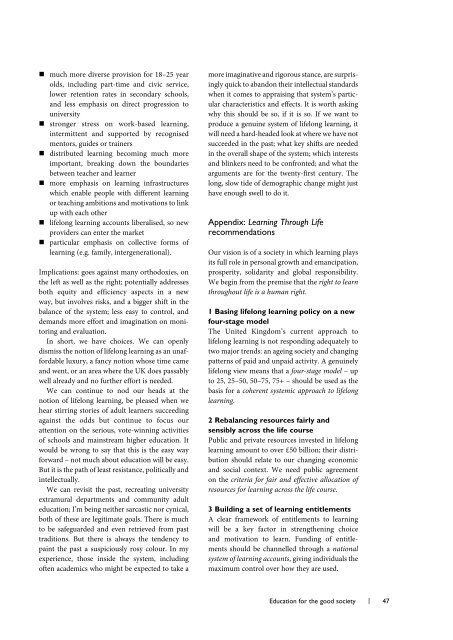EDUCATION FOR THE GOOD SOCIETY - Support
EDUCATION FOR THE GOOD SOCIETY - Support
EDUCATION FOR THE GOOD SOCIETY - Support
You also want an ePaper? Increase the reach of your titles
YUMPU automatically turns print PDFs into web optimized ePapers that Google loves.
• much more diverse provision for 18–25 yearolds, including part-time and civic service,lower retention rates in secondary schools,and less emphasis on direct progression touniversity• stronger stress on work-based learning,intermittent and supported by recognisedmentors, guides or trainers• distributed learning becoming much moreimportant, breaking down the boundariesbetween teacher and learner• more emphasis on learning infrastructureswhich enable people with different learningor teaching ambitions and motivations to linkup with each other• lifelong learning accounts liberalised, so newproviders can enter the market• particular emphasis on collective forms oflearning (e.g. family, intergenerational).Implications: goes against many orthodoxies, onthe left as well as the right; potentially addressesboth equity and efficiency aspects in a newway, but involves risks, and a bigger shift in thebalance of the system; less easy to control, anddemands more effort and imagination on monitoringand evaluation.In short, we have choices. We can openlydismiss the notion of lifelong learning as an unaffordableluxury, a fancy notion whose time cameand went, or an area where the UK does passablywell already and no further effort is needed.We can continue to nod our heads at thenotion of lifelong learning, be pleased when wehear stirring stories of adult learners succeedingagainst the odds but continue to focus ourattention on the serious, vote-winning activitiesof schools and mainstream higher education. Itwould be wrong to say that this is the easy wayforward – not much about education will be easy.But it is the path of least resistance, politically andintellectually.We can revisit the past, recreating universityextramural departments and community adulteducation; I’m being neither sarcastic nor cynical,both of these are legitimate goals. There is muchto be safeguarded and even retrieved from pasttraditions. But there is always the tendency topaint the past a suspiciously rosy colour. In myexperience, those inside the system, includingoften academics who might be expected to take amore imaginative and rigorous stance, are surprisinglyquick to abandon their intellectual standardswhen it comes to appraising that system’s particularcharacteristics and effects. It is worth askingwhy this should be so, if it is so. If we want toproduce a genuine system of lifelong learning, itwill need a hard-headed look at where we have notsucceeded in the past; what key shifts are neededin the overall shape of the system; which interestsand blinkers need to be confronted; and what thearguments are for the twenty-first century. Thelong, slow tide of demographic change might justhave enough swell to do it.Appendix: Learning Through LiferecommendationsOur vision is of a society in which learning playsits full role in personal growth and emancipation,prosperity, solidarity and global responsibility.We begin from the premise that the right to learnthroughout life is a human right.1 Basing lifelong learning policy on a newfour-stage modelThe United Kingdom’s current approach tolifelong learning is not responding adequately totwo major trends: an ageing society and changingpatterns of paid and unpaid activity. A genuinelylifelong view means that a four-stage model – upto 25, 25–50, 50–75, 75+ – should be used as thebasis for a coherent systemic approach to lifelonglearning.2 Rebalancing resources fairly andsensibly across the life coursePublic and private resources invested in lifelonglearning amount to over £50 billion; their distributionshould relate to our changing economicand social context. We need public agreementon the criteria for fair and effective allocation ofresources for learning across the life course.3 Building a set of learning entitlementsA clear framework of entitlements to learningwill be a key factor in strengthening choiceand motivation to learn. Funding of entitlementsshould be channelled through a nationalsystem of learning accounts, giving individuals themaximum control over how they are used.Education for the good society | 47





![[2012] UKUT 399 (TCC)](https://img.yumpu.com/51352289/1/184x260/2012-ukut-399-tcc.jpg?quality=85)





![Neutral Citation Number: [2009] EWHC 3198 (Ch) Case No: CH ...](https://img.yumpu.com/50120201/1/184x260/neutral-citation-number-2009-ewhc-3198-ch-case-no-ch-.jpg?quality=85)




